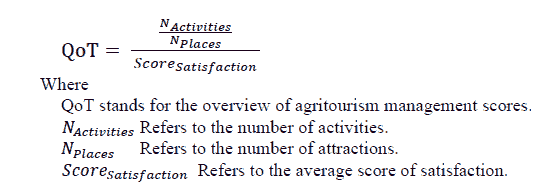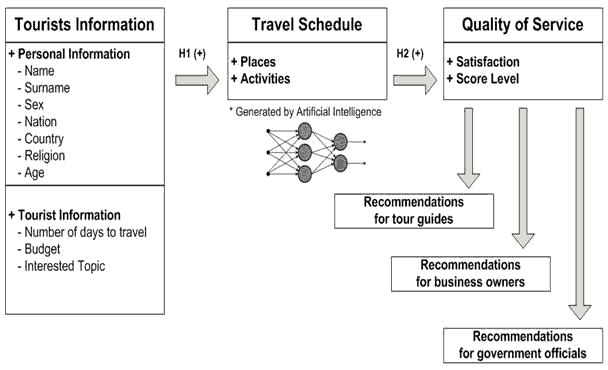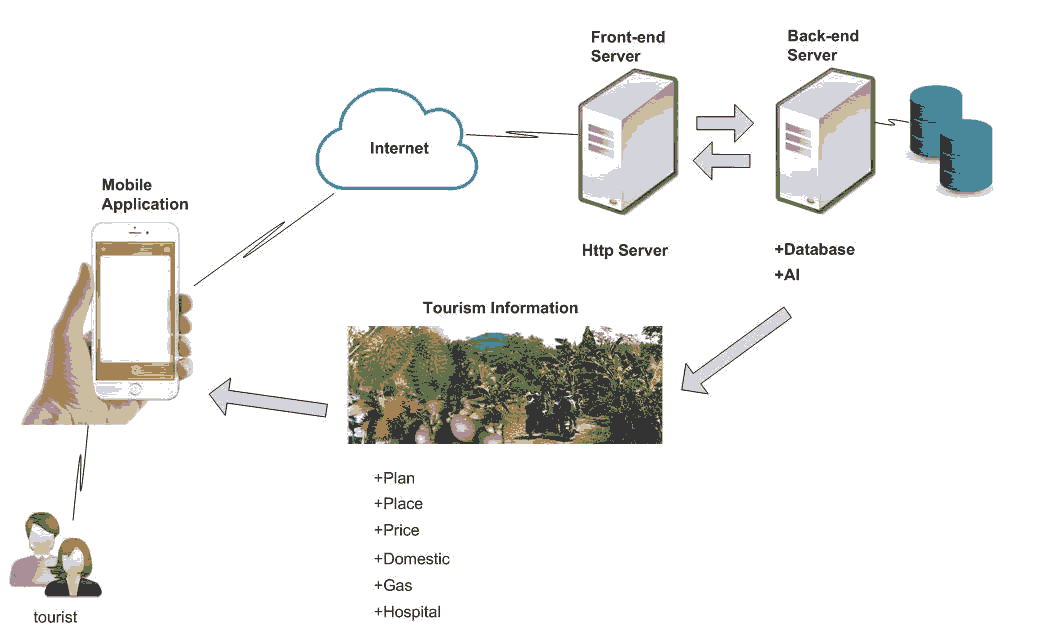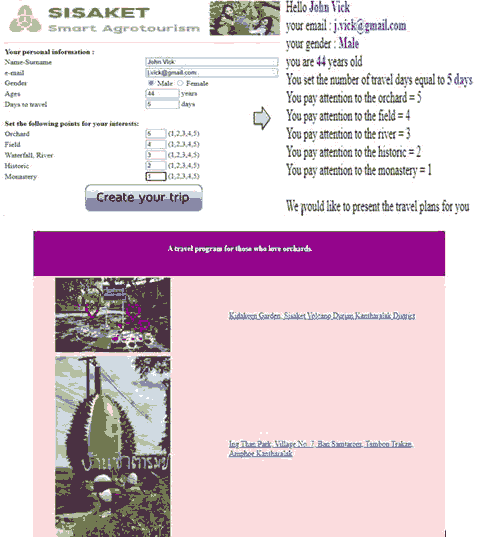Research Article: 2021 Vol: 24 Issue: 1S
AI Recommended Agrotourism Supporting Community-Based Tourism Post Covid-19
Pannee Suanpang, Suan Dusit University
Pathanapong Pothipasa, Sisaket Rajabhat University
Abstract
This paper aims to develop Artificial Intelligence (AI) recommended agrotourism supporting community-based tourism in the post-COVID 19 periods for a new dimension of the next normal case study in Sisaket Province of Thailand. The proposed system was developed under Software Development Life Cycle (SDLC) to provide an impressive experience, and new model that respect to the needs of tourists in agrotourism. In this research, a decision support system was developed and provided tourism information through a mobile application to t collect traveler’s information such as gender, age, number of days travelled, budget and preferred travel style. The information was submitted to classification to generate the appropriate tourism programs using the Extreme Learning Machine. After the classification process, an appropriate itinerary will be created and sent to the tourists back. In additional, the proposed system also provides a feedback and rating section to assess the correspondence of the tour arrangement with the high level of traveler’s satisfaction. To evaluate the proposed system, 400 test data from 400 tourists was tested. The experimental results show that, the tourist satisfaction was highest, with quick process, convenient, the system is easy to use and the system is clear and beautiful respectively. Moreover, an AI recommended agrotourism will be used to support and promote community-based tourism in a pilot filed in Sisaket Province, of Thailand to boosting travel industry in the Post Period of COVID-19 to obtain a new approach of the next normal travel.
Keywords
Agrotourism, Artificial Intelligent Recommended System, Community-Based Tourism, Post COVID-19
Introduction
Tourism is one of the major industries and driving force of the economy and social surplus which generates business around that world (Jermsittiparsert & Chankoson, 2019; Suanpang, Netwong & Chunhapataragu, 2021). One of the trends of tourism in post Covid-19 is ‘agrotourism’ which becoming significantly important in developing countries due to the ability to generate income and stimulate economic for farmers and associated local communities (Arroyo, Barbieri & Rich, 2013; Suanpang et al., 2021a). Agrotourism is create recreation opportunity in the community areas can generate revenue and employment for local communities especially the natural landscape which low urban influence has a high potential to attract tourists (Gao, Barbieri & Valdivia, 2014; Rambodagedara et al., 2015). Moreover, agrotourism is the mechanician driving forces of the inequality development of urban and rural affect the stability of the country and is a solution to survive in todays’ competitive and changing environment (Srithong, Suthitakon & Karnjanakit, 2019).
Although the tourism industry contributes to high economic growth and has been pragmatic in several countries especially in Thailand which is one of the top tourist countries in the world having beautiful natural resources, historical and high-value hospitality services (Jermsittiparsert & Chankoson, 2019; Suanpang & Jamjuntr, 2021; Suanpang et al., 2021a; Suanpang et al., 2021b). Agriculture is considered the backbone of Thailand, with most of the population working in agriculture and allied activities. Agrotourism in Thailand is one of the most important tourism because it can be both enjoyable and knowledge can be brought back to be applied or make a career, above all is to return to learn and understand. Proud of their farming career, the foundation of the Thai land that is full of values under the concept of knowledge philosophy. Wisdom of Thai farmers' ancestors, customs, culture, traditions, activities, and agricultural occupations that generate income for the community. Agriculture has been a part of the Thai way of life since ancient times, and Thai people have relished making a living from the gifts of nature from the motherland (Srithong, Suthitakon & Karnjanakit, 2019). Agrotourism in Thailand is not to optimize profits but the achievement of benefits for local communities, incasing quality of life, and environmental conservation within the sufficiency economy (Chaiphan, 2016). Moreover, agrotourism in Thailand is promoting self-sufficiency and is practiced by a sufficiency economy, with activities based on ecological and environmental preservation to ensure the health of the ecosystem, human population and natural environment can be sustained (Tseng et al., 2019).
Thailand tourism is one of the major contributors to the economy, estimated to directly contribute 5.56 per cent of GDP before the crisis of the COVID-19 epidemic (Suanpang & Jamjuntr, 2021; Suanpang et al., 2021a; Suanpang et al., 2021b). During the current outbreak of the COVID-19 pandemic in Thailand the tourism industry was in a lockdown and shutdown with no international arrivals and people had to lockdown at home as well (Suanpang et al., 2021a; Suanpang et al., 2021b). This directly affected the tourism industry; therefore, the government release a policy to promote agrotourism, gastronomy tourism and health tourism to reboot and stimulate tourism for the domestic market and prepare for post Covid-19 (Suanpang & Jamjuntr, 2021; Suanpang et al., 2021b). From the situation review of agrotourism in Thailand found that it is a new dimensions of the tourism and not widespread while the agriculture is the backbone of the country. Especially, in Srisaket province is a bordering province in the E-sarn region where there is a rich cultural heritage and natural and agricultural resource such as forests, rivers, and wild animals (Chaigassem & Tunming, 2019). Especially, Lava Durian Sisaket is becoming famous and agrotourism in durian farm is becoming the new destination which can generate income for local community and it support tourism in post COVID-19.
With the advance of Information and Communication Technology (ICT) especially the application of Artificial Intelligence (AI) that have been implemented in agrotourism. This research is relatively new in Thailand, and consistent with the concept of stops "content all around you" application, this application will help manage travel information using location-based tracking technology and present information in both 2- and 3-dimensions allowing users, to pass information to each other (Users-generated Information). It also enhances the travel experience, making the story more interesting. It will also help SMEs tourism business or alternative tourist attractions become more widely known (Tanantpapat et al., 2019; Suanpang et al., 2021b). In other research on the application of artificial intelligence to support agrotourism, it was found that if it is presented as an application or system, but not used to describe the linkages of inputs, processes, and quality of service. Therefore, in this research, the research presents it in an omnidirectional perspective. The viewpoint of the tourists themselves tour guide's point of view business owner's perspective including the views of government officials who contribute to agricultural tourism. In addition, from the literature review of many research articles, the researcher found that most of them only present a model of applying artificial intelligence to rhetorical tourism, which is difficult to implement in Thailand, including having complex system performance metrics that are not suitable for use with small tourism service operators.
To bridge the gap, in this research, we applied recommended agrotourism for supporting community-based tourism post-COVID 19 for a new dimension of the next normal case study in Sisaket province, Thailand to promote community-based tourism. The research was carried out with the following objectives (1) to design an artificial intelligence system to support agrotourism for adapting to support agrotourism attractions in Sisaket province, which is a sample area in Thailand (2) propose a quality of agrotourism management model based on imported data and feedback from tourists for consideration and (3) user evaluate the system performance and satisfaction.
Literature Review
Agrotourism
“Agrotourism” or “agritourism” is defined as tourism activities exercised by a farmer through the exploitation of the farm (Ammirato & Felicetti, 2014). Agrotourism refers to tourism services provided by agricultural entrepreneurs within their farms, also allowing tourists to take direct and indirectly architectural activities. Agritourism farms may offer services as hospitality, meal provision, farm tour, onsite processing of agricultural goods and pick own activities (Phillip et al., 2010). Moreover, agrotourism refers to tourism that focuses on learning agricultural ways and the Karma of the rural people by emphasizing the participation of tourists in carrying out activities and learning about agriculture and the way of life, culture, and traditions of farmers. The farmers use the available resources for teaching to bring benefits and income to the community and farmers through agricultural tourism. Agrotourism is a trip to agricultural areas, agricultural plantations, agroforestry, herb gardens, livestock farms and livestock (Ammirato & Felicetti, 2014; Suanpang et al., 2021b).
Agrotourism is a type of tourism that aims to provide knowledge of sustainable agriculture; it may include having tourists participate in local agricultural activities while learning about local cultures, traditions, and ways of life (Suanpang et al., 2021b). A few studies present a growing travelling trend that brings in a significant revenue stream to agricultural farms. This study preliminary explored the industry through in-depth interviews with agrotourism operators and identified key success factors of the business in terms of tourism service design, sustainable management, and marketing of agrotourism destinations. The study also identified challenges of promoting agrotourism destinations, through social media the main communication channel, faced by agrotourism operators especially one that is a small size. Most importantly, this study identified trends within the agrotourism industry which are (1) experiential learning of agricultural, (2) back to nature, and (3) eat organic food and made recommendations on how to serve the trends (Natarnith, 2016).
Community-Based Tourism (CBT) in Post COVID-19
The effects of the global pandemic have also affected the tourism industry around the world. In July 2021, international communities are still struggling to cope with the ongoing effects of the pandemic with more than 191 million confirmed recorded cases globally (Noorashid & Chin, 2021). Many research study has been done to assess the current situation to prepare future guidelines and action plans for global communities for post Covid-19. CBT is normally marked by certain criteria such as tourism involving community members and their participation, community control and empowerment, conservation, and its contribution to the well-being and the development of community (Noorashid & Chin, 2021). Recent literature on COVID-19 has suggested that promoting CBT is an alternative way to boost the capacity and contribution of local economy in respective countries (Lendelvo, Pinto & Sullivan, 2020; Stone et al., 2021; Noorashid & Chin, 2021). While Nyakiba, Nason & Onchieku (2018) claim that the growing CBT industry can be seen all over the world, particularly in developing countries, current reports have now raised the definite value of CBT as an alternative tourism during and post-COVID-19, which includes promoting community-based products and services such as providing accommodation and utilizing local resources (Carr, 2020; Noorashid & Chin, 2021).
AI in Agrotourism
In the research of Martin Zsarnoczky (2017), who described that artificial intelligence is a new form of intelligence, which synthesizes the concepts of the current technological revolution, demands, sustainability and effectiveness simultaneously. The use of artificial intelligence can be applied in many fields and is expanding in all industry sectors. For online users, it is common to share information or send it back to large companies, and organizations can analyze big data and build profiles for each customer. The effectiveness of interactive communication is essential for innovative companies to increase sales. The ICT revolution has made a huge change in the tourism industry as well. AI-powered chatbots and other intelligent solutions used by various service providers allow the development of personalized offers. AI-related solutions are still not prevalent in the tourism sector, but it is expected to be used more often in the future to enhance the quality of products and services. The further expansion of artificial intelligence has a positive impact on the future of the tourism sector. Based on the literature review, the research proposes a conceptual framework is in Figure 1.
Conceptual Framework
To obtain the new framework, which solves the problem of community-based agrotourism in the pilot field of Sisaket Province, of Thailand to boosting the travel industry after COVID-19, the research team has formulated a conceptual framework based on artificial intelligence applications. We found that, thus the proposed system presented as an application, but is cannot describe the linkages of inputs, processes, and quality of service. as shows in Figure 1.
Therefore, the research team presents the proposed conceptual framework in form of an omnidirectional perspective. The viewpoint of the tourists themselves, the tour guide's point of view and the business owner's perspective including the views of government officials who contribute to agricultural tourism as shown in Figure 2.
In Figure 2, the inputs from tourists in terms of personal data and tourist interest data are used to create an itinerary and activity description for each traveler. The quality of service is assessed through the traveler satisfaction questionnaire as well as the rating of each service in the itinerary. The score level earned for each component of the itinerary is consistent with the research on measuring tourist satisfaction by attribute and motivation: In the case of nature-based resorts by Fang, Yodmanee & Muzaffer (2008), and research on a subcultural analysis of tourism motivations by Mimi Li, et al., (2013) details are handed to the tour conductor, business owner and relevant government officials to improve service levels in the future.
Research Methodology
In this study, the researchers conducted a research methodology that is aligned with the research titled Digital Omotenashi: toward a Smart Tourism Design System by Lim, Mostafa & Park (2017). Like the SDLC software development process that is commonly used in computers with the following steps (1) define problems and inspiration for solving them (2) define research objectives and identify solutions to problems (3) system architecture design (4) conduct system development (5) perform system testing and evaluation and (6) present what is researched and developed. In addition, the researchers presented one equation for assessing the quality of agritourism management as shown in Equation (1).

Equation (1) is consistent with the conceptual framework of this study; it shows the top term of the equation which expresses the relationship between the numbers of activities to the number of places. Therefore, the number of activities in the itinerary that are too many and less satisfying for tourists will result in a lower QoT than the lower activity per location but the same average satisfaction.
The quantitative research methodology is applying for testing the AI recommended system by a questionnaire that included 9 closed questions that relate to the demographic of the sample used. The second section of the questionnaire consisted of about 25 closed questions. The questions used the Likert 5 scale ranging from 5=strongly agree, 4=agree, 3=moderate, 2=disagree, 1=strongly disagree. The reliability of the measures was tested using Cronbach’s alpha=0.95. Data was analyzed using SPSS for descriptive statistics.
Population and Sample
The population was domestics tourists in Thailand. A non-probability sampling technique like convenience was used. The sample size of more than 400 samples was based on
The study about demographics found that most of the tourists were females 65.25% and 24.25% 400 shown by Cochran (1977) with a confidence level of 95% (α=0.05).
Demographics of the sample
Were males, Most were aged between 25-34 45.25%, were employees of companies/ enterprise 42.25%, having a bachelor’s degree 65.17%, with an average monthly income of between 0,001-15,000-baht, 30%, respectively. Tourists prefer to travel with their families/lovers the most 50.15%, with an average rest day per trip of about 2-3 nights each time 40.12 % respectively.
Research Results
The study and development of an artificial intelligence system to support agrotourism for smart cities has resulted in a three-part architecture system with a front-end that interfaces with tourists as a mobile application and web applications, the second part is the webserver located outside the research site, and the last is the processing part which consists of a database system and an artificial intelligence system. as shows in Figure 3.
The system works by comparing your personal data and attraction's hierarchy with model data to predict what class of travel itinerary should be. Before creating a Trip Plan that is related to each traveler's class.
After the AI recommend agrotourism prototype was implement and 400 users evaluated the satisfaction of the system for improving the performance of the system. The result of the system evaluation show in Table 1
| Table 1 The Ai Recommend Agrotourism Evaluation |
||
|---|---|---|
| Variable | S.D. | |
| 1. Benefit of the AI recommend agrotourism system | 4.24 | 0.55 |


